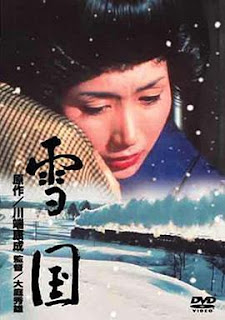37. Ē-sái tī chia liān-khîm
Shimamura siūⁿ-tio̍h lia̍h-liông cha-bó͘ ê ōe, tō kóng, mā ē-sái tī chia liān khîm. Komako thiaⁿ tio̍h, tō khiā khí-lâi, khà tiān-ōe túiⁿ-chhù, kiò lâng kā tn̂g-koa* phō͘ hām thè-ōaⁿ ê saⁿ lóng tâng-chê the̍h lâi. [* tn̂g-koa = 長唄, tôaⁿ-khîm phōaⁿ-chhiùⁿ ê koa]
Ji̍t-sî khòaⁿ ê hit-keng chhù kám ū tiān-ōe? Shimamura tú siūⁿ tio̍h che, thâu-khak-té iū phû-chhut Yoko ê ba̍k-chiu.
"Hit-ê ko͘-niû ē sàng lâi?"
"Khó-lêng sī án-ne."
"Hit-ê hāu-seⁿ ū kā lí kòe-tiāⁿ?"
"Ai-ah. Tang-sî thiaⁿ lâng kóng ê?"
"Cha-huiⁿ."
"Koài-lâng! Thiaⁿ tio̍h tō thiaⁿ tio̍h. Cha-huiⁿ ná m̄-kóng?" M̄-koh chit-kái yi bô chhiūⁿ cha-huiⁿ pìⁿ-bīn, kan-ta chhián-chhián chhiò chi̍t-ē.
"Hit-chióng tāi-chì pháiⁿ khui-chhùi, tî-hui góa khòaⁿ lí bô."
"Kóng hit-lō khang-khak ōe. Tokyo-lâng ài pe̍h-chha̍t, chìn thó-ià!"
"Lí khòaⁿ, góa tú khui-chhùi, lí tō kóng tùi pa̍t-ūi khì."
"Chiah bô kóng tùi pa̍t-ūi khì. Án-ne kóng, lí kā he tòng-chò chin?"
"Góa kā tòng-chò chin."
"Iū-koh pe̍h-chha̍t ah. Lí bêng-bêng bē kā he tòng-chò chin."
"Tong-jiân, góa kám-kak sió-khóa bē lí-kái. M̄-koh, ū-lâng kóng, lí sī ūi-tio̍h bī-hun-hu ê i-io̍h-hùi, chiah chhut-lâi chò gē-tòaⁿ."
"Thó-ià, bē-su sin-phài ê hì-kio̍k. Kóng goán í-keng kòe-tiāⁿ, he sī o͘-pe̍h kóng. Án-ne siūⁿ ê lâng mā ká-ná bē chió. Góa m̄-sī ūi sáng chiah chò gē-tòaⁿ, m̄-koh chò ē-kàu ê, góa mā ē chò."
"Lí ká-ná tih kóng bī-chhai neh."
"Góa kóng khah pe̍h leh. Sai-hū hoān-sè bat siūⁿ-kóng, hāu-seⁿ ē-sái hām góa chò-tīn, m̄-koh mā kan-ta sim-koaⁿ án-ne siūⁿ, chhùi to lóng m̄-bat kóng kòe. Sai-hū ê chit-chióng sim-su, hāu-seⁿ hām góa lóng sió-khóa ū kám-kak tio̍h. M̄-koh, goán nn̄g-lâng pēng bô sáⁿ-mih te̍k-pia̍t ê tāi-chì. Tō-sī án-ne niā-niā."
"Chìn hó ê gín-á phōaⁿ ah!"
--
37. 會使 tī 遮練琴
Shimamura 想著掠龍查某 ê 話, tō 講, mā 會使 tī 遮練琴. Komako 聽著, tō 徛起來, 敲電話 túiⁿ 厝, 叫人 kā tn̂g-koa* 簿和替換 ê 衫攏同齊提來. [* 長歌 = 長唄, 彈琴伴唱 ê 歌]
日時看 ê 彼間厝敢有電話? Shimamura 拄想著這, 頭殼底又浮出 Yoko ê 目睭.
"彼个姑娘會送來?"
"可能是 án-ne."
"彼个後生有 kā 你過 tiāⁿ?"
"Ai-ah. 當時聽人講 ê?"
"Cha-huiⁿ."
"怪人! 聽著 tō 聽著. Cha-huiⁿ 那毋講?" 毋過這改她無像 cha-huiⁿ pìⁿ 面, 干焦淺淺笑一下.
"彼種代誌歹開喙, 除非我看你無."
"講 hit-lō 空殼話. Tokyo 人愛白賊, 晉討厭!"
"你看, 我拄開喙, 你 tō 講對別位去."
"才無講對別位去. Án-ne 講, 你 kā 彼當做真?"
"我 kā 當做真."
"又閣白賊 ah. 你明明袂 kā 彼當做真."
"當然, 我感覺小可袂理解. 毋過, 有人講, 你是為著未婚夫 ê 醫藥費, 才出來做藝旦."
"討厭, 袂輸新派 ê 戲劇. 講阮已經過 tiāⁿ, 彼是烏白講. Án-ne 想 ê 人 mā ká-ná 袂少. 我毋是為 sáng 才做藝旦, 毋過做會到 ê, 我 mā 會做."
"你 ká-ná tih 講謎猜 neh."
"我講較白 leh. 師傅凡勢 bat 想講, 後生會使和我做陣, 毋過 mā 干焦心肝 án-ne 想, 喙 to 攏 m̄-bat 講過. 師傅 ê 這種心思, 後生和我攏小可有感覺著. 毋過, 阮兩人並無啥物特別 ê 代誌. Tō 是 án-ne niā-niā."
"晉好 ê 囡仔伴 ah!"
--
37.
Shimamura, remembering what the masseuse had said, suggested that she practice here instead. Immediately she telephoned her house to ask for music and a change of clothes.
So the house he had seen the day before had a telephone, thought Shimamura. The eyes of the other girl, Yoko, floated into his mind.
"That girl will bring your music?"
"She might."
"You're engaged to the son, are you?"
"Well! When did you hear that?"
"Yesterday."
"Aren't you strange? If you heard it yesterday, why didn't you tell me?" But her tone showed none of the sharpness of the day before. Today there was only a clean smile on her face.
"That son of thing would be eaSIer to talk about if I had less respect for you."
"What are you really thinking, I wonder? That's why I don't like Tokyo people."
"You're trying to change the subject. You haven't answered my question, you know."
"I'm not trying to change the subject. You really believed it?"
"I did."
"You're lying again. You didn't really."
"I couldn't quite believe all of it, as a matter of
fact. But they said you went to work as a geisha to help pay doctors' bills."
"It sounds like something out of a cheap magazine. But it's not true. I was never engaged to him. People seem to think I was, though. It wasn't to help anyone in particular that I became a geisha. But I owe a great deal to his mother, and I had to do what I could."
"You're talking in riddles."
"I'll tell you everything. Very clearly. There does seem to have been a time when his mother thought it would be a good idea for us to get married. But she only thought it. She never said a word. Both of us knew in a vague sort of way what was on her mind, but it went no farther. And that's all there is to tell."
"Childhood friends."
--


No comments:
Post a Comment